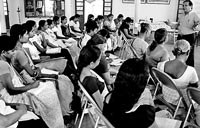
LMS: A beacon of light to Lanka womenTwenty-eight pre-school teachers from across the country, listened attentively as an official from the Children’s Secretariat spoke to them on early childhood education and development. Employed as teachers in the network of rural pre-schools and day care centres run by Lanka Mahila Samithi (LMS), they were appreciative of the opportunity to upgrade their knowledge. During the three-day residential course, these rural teachers had the opportunity of furthering their knowledge and also learning from the experiences of their fellow teachers. The course was conducted in the spacious hall of the Mahila Samithi Training Centre at Kaduwela.
Food and lodging were provided free of charge to the participants who also received their travelling costs, said Ms. Priya Arandara, an Executive Committee member of LMS. The training centre has facilities to accommodate about 50 participants in clean, well-kept dormitories. “We organise these upgrading courses every year for the pre-school teachers,” said Mrs. Ranee Herath, President of the Lanka Mahila Samithi. “In addition we also conduct three-month courses for new trainees. All these courses are provided completely free of charge.” Mr. Chandrapala Dissanayake, who was conducting the lecture explained that the course was a combined project of the Children’s Secretariat of the Ministry of Child Development and Women’s Empowerment with the Health Ministry. It was part of a national plan formulated for Early Childhood Care and Development. The aim of the plan is to develop child-friendly pre-schools, to give the child an opportunity to spend time happily and at peace. A book has been prepared on ‘Pre-school Education’, he said. “We create awareness among the teachers and also encourage the participation of parents, which is important in pre-school education.” Committees have been set up across the districts. Representatives of the Medical Officer of Health for the area also conduct lectures on the health care aspects of children under five. Sr. Padmini Mallika was present that day to speak about the importance of nutrition in the first five years of the child. A medical doctor had spoken to the teachers the previous day on the development of the mind and care of illness. The Lanka Mahila Samithi runs about 120 day care centres and pre-schools around the country. At the Kaduwela Training Centre, a day care and pre-school has been established. The children, including babies are well cared for and a meal is provided to them. The parents pay a reasonable fee for the service. Mrs. K.V. Nanda Karawita, an experienced pre-school teacher, has been working with the Mahila Samithi since the inception of the training centre in 1948. She runs the day care centre and pre-school and is also involved in training teachers. The concept of day care was first started in Sri Lanka by the Mahila Samithi in 1943, Nanda said. The first centre was at Alubowila in Panadura. The day care centres are a great help to the working mothers in the villages, as it enables them to engage in some employment. The Lanka Mahila Samithi, a national non-governmental organisation is one of the oldest women’s organisations in Sri Lanka. It was started in 1930 by Dr. Mary Ratnam and from its inception has been affiliated to the Associated Country Women of the World (ACWW) in the United Kingdom. Apart from the day care centres, LMS has undertaken a wide range of programmes for the benefit of rural women. Training is conducted on subjects such as Empowerment of Women, Reproduction and General Health Education, Income Generation through Self-employment, Handicrafts, Home-gardening, Animal Husbandry, Thrift and Savings and Better Family Living. Mobile health clinics, day care centres for elders and counselling are also among the services offered by LMS. Lanka Mahila Samithi is active in and around the country except in the North and East. The members of rural branches of LMS are trained to produce useful and beautiful articles from locally available, eco-friendly raw materials such as rush, reed ekel, cane, bamboo and hemp. They also turn out batiks, pottery, traditional lace, embroidered garments, tableware and linen. The crafts produced by the rural Samithi members are sold at the sales centre at Liberty Plaza. Members benefit by obtaining a fair price for the sale of their products. This greatly helps in uplifting their income. |
|| Front
Page | News | Editorial | Columns | Sports | Plus | Financial
Times | International | Mirror | TV
Times | Funday
Times || |
| |
Copyright
2007 Wijeya
Newspapers Ltd.Colombo. Sri Lanka. |
